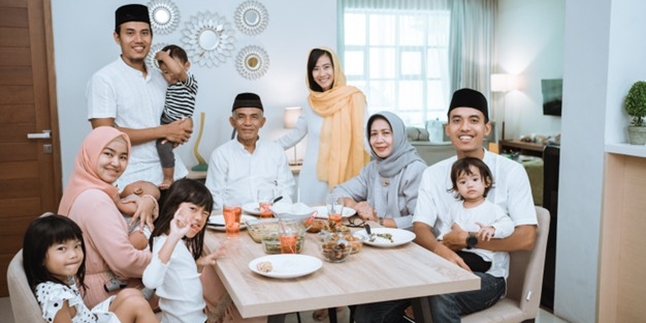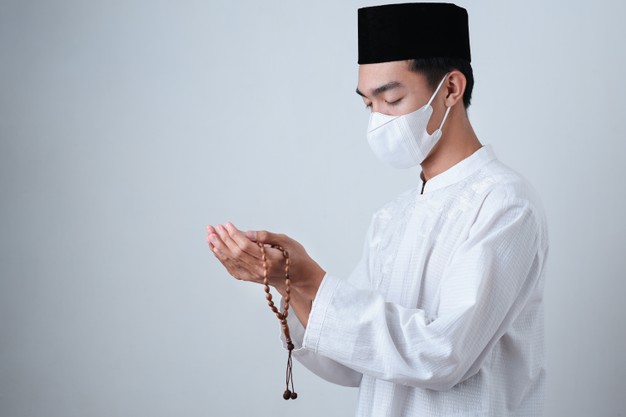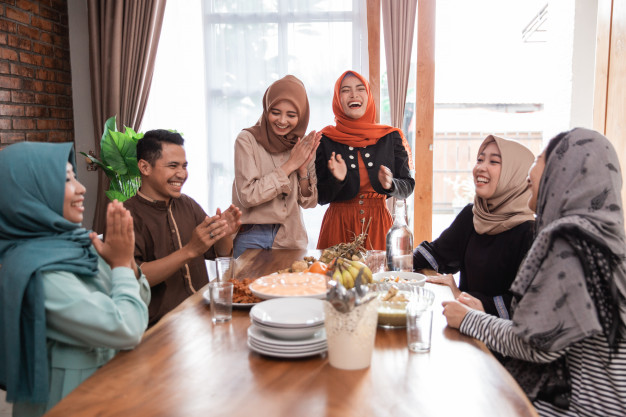10 Delicious Vegetable Bakwan Recipes, Homemade Affordable Fritters
Just go ahead, check out the savory vegetable fritters recipe, cheap homemade fried food

Kapanlagi.com - Eid al-Fitr is eagerly awaited by Muslims around the world, including Indonesia. However, this year's celebration is different from previous years due to the Covid-19 pandemic. This has caused several Lebaran traditions to change.
Not only Lebaran traditions that have changed, but also Ramadan traditions. There are no religious gatherings or iftar events. This certainly makes Muslims around the world, including Indonesia, miss the activities during Ramadan.
So, what are the changed traditions? According to various sources, here are 6 Lebaran traditions that have changed during the Covid-19 pandemic. Let's check it out KLovers.

Illustration (credit: Freepik)
The tradition of Eid that changed during the first pandemic is the presence of silaturahmi. Yup! During Eid, it is an opportunity for us to have silaturahmi with family and close friends. For those who are out of town, they will go home to meet their relatives.
However, this cannot be done, and it makes us feel separated by distance. Nevertheless, because the world has advanced, we can still have silaturahmi activities online. Yes, online silaturahmi can be easily done and it feels very close.
We can have online silaturahmi activities by contacting each other through voice or video. This method is done to connect distant families and make silaturahmi possible on Eid al-Fitr.

Illustration (credit: Freepik)
Still in terms of maintaining relationships, many of you are migrants or far from your parents and even immediate family. And to meet with extended family happily is by going home during the holidays. However, this cannot be done due to the COVID-19 pandemic.
To reduce the spread of COVID-19, the government has imposed a ban on going home. Thus, the tradition of going home that always occurs every year in Indonesia, and becomes an eagerly awaited event, must be stopped for the sake of the well-being and reduction of COVID-19 transmission.

Illustration (credit: Freepik)
Due to the COVID-19 pandemic, many places of worship have to be closed. This certainly disrupts worship during the month of Ramadan, one of which is tarawih prayers. Yes, there were pros and cons regarding the absence of tarawih prayers and also Eid prayers until Eid al-Adha.
This is because at that time the COVID-19 pandemic had just occurred. However, in 2021, many areas have carried out tarawih prayers in mosques, even though it must be done with health protocols. For example, mosques that are allowed to operate in green zones still have to maintain distance, use masks, and wash hands.
Even for activities such as Itikaf, breaking the fast together in the mosque, and intensive Islamic boarding schools, they must be limited and conducted with distancing. This is done for the well-being of the community and to reduce the spread of COVID-19.

Illustration (credit: Freepik)
During the Ramadan fasting month, doing activities together feels like a must. Usually, iftar gatherings are done by all people of all ages.
There are schedules for iftar gatherings with elementary school alumni to college students, there are schedules for iftar gatherings with office friends, and even iftar gatherings with family. However, due to the COVID-19 pandemic, we have to cancel or reduce iftar gatherings.
Not only iftar gatherings, but visiting graves is also one of the activities that is a tradition in Indonesia. However, at this time it must be reduced or even not allowed to do such activities for now.

Illustration (credit: Freepik)
Due to the COVID-19 pandemic and the decrease in direct socializing, sending hampers or commonly known as Eid parcels has become one way to socialize. Yup! Although parcels or hampers have existed since long ago, the demand during the COVID-19 pandemic is greater.
Those who are hindered by distance or reduce socializing choose to send hampers as a unique way of socializing. There are already many types of hampers that you can give, such as prayer tools, cookies, bathing equipment, eating utensils, snacks, and many more.

Illustration (credit: Freepik)
And one of the Eid al-Fitr traditions that changed during the last COVID-19 pandemic is the restricted village tour agenda. Yes, going around the village to visit relatives and friends is indeed a common practice during Eid al-Fitr. However, during this COVID-19 pandemic, this activity is restricted and even canceled.
For those who still engage in social visits, they must adhere to health protocols by maintaining distance, wearing masks, and washing hands before consuming snacks. However, there are still many areas that prohibit the tradition of going around the village to prevent the spread of COVID-19.
Those are the 6 Eid al-Fitr traditions that have changed during the COVID-19 pandemic. It is not only a change for Indonesian society, but Muslims worldwide also experience changes in the traditions of Eid al-Fitr. Hopefully, this pandemic will end soon and all human beings can return to normal activities.
(kpl/dhm)
Cobain For You Page (FYP) Yang kamu suka ada di sini,
lihat isinya
Just go ahead, check out the savory vegetable fritters recipe, cheap homemade fried food
Here are 60 wise Islamic words of comfort, which can be good advice for life. Let's check it out KLovers.
When posting a selfie photo, writing a caption for yourself as a complement to the photo can be quite difficult. Because, writing a message for yourself is not as easy as writing a message for others.
Currently, we can easily find rawon, from food stalls to restaurants. However, with a special rawon recipe, we can make rawon with a special homey taste.
Cooking grilled fish recipes at home can be a fun activity with your family. Especially after it's cooked, you can enjoy it with your family. Accompanied by white rice, sambal, and fresh vegetables, grilled fish can be a delicious and special dish to enjoy with your family.
Here are 6 easy and delicious fish curry recipes that are not fishy. Let's check it out KLovers.
This is 4 ways to attract fortune during Ramadan that can be done. Let's check it out KLovers.
Just go ahead, check out some easy and crispy onion peanut snack recipes for family during Eid below.
Without further ado, here are the delicious and simple cheese stick recipes that are perfect for serving during Eid.
There are many people who capture moments with their partners and upload them on social media. Not forgetting, to make the posts more memorable, they include romantic and touching captions for their partners.
This is the definition of Sunnah Muakkad prayer along with its types and conditions. Let's check it out, KLovers.
This is the recipe for homemade es kuwut, a refreshing takjil for Ramadan fasting.